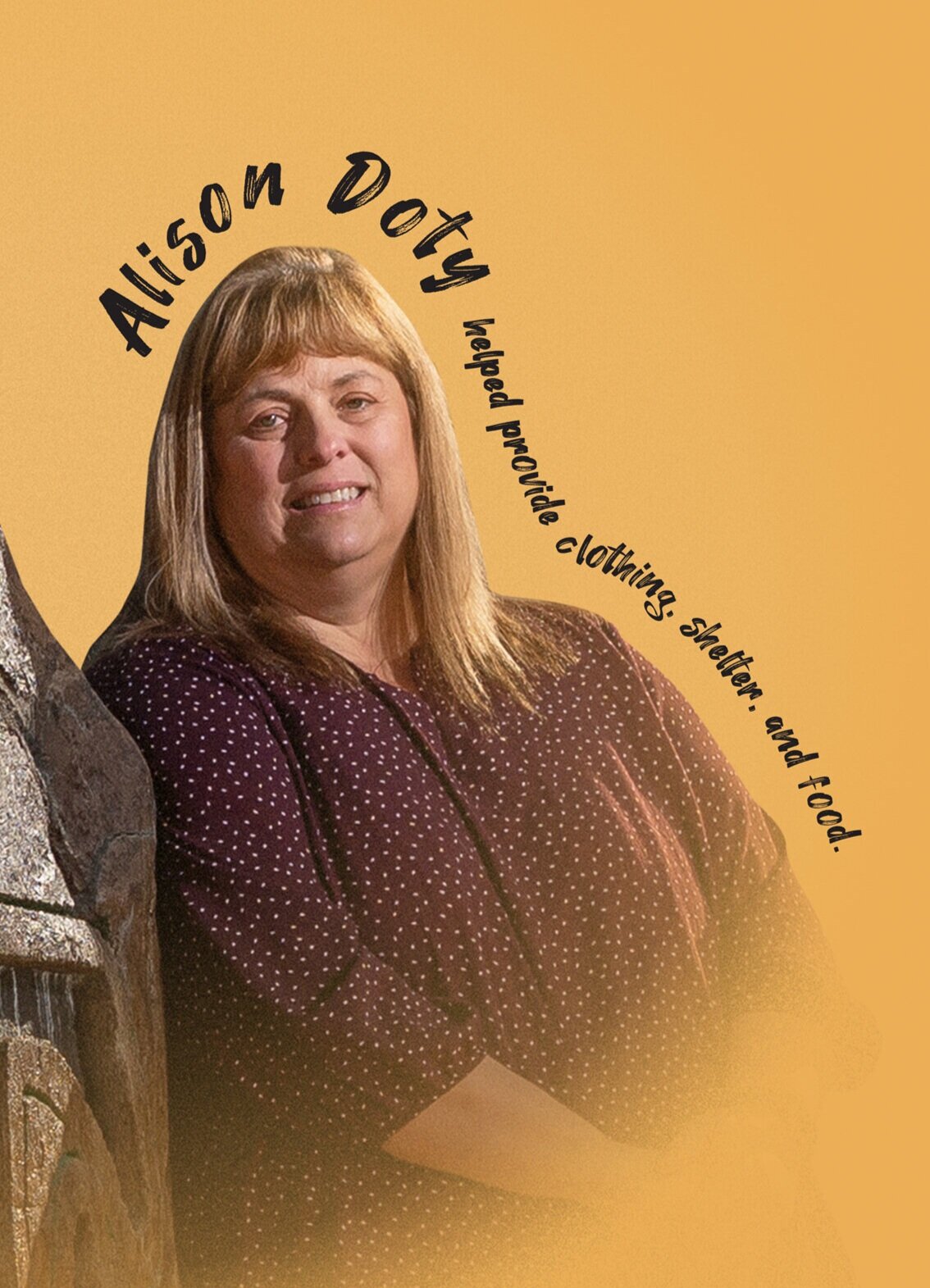Shining Brightly Through the Haze

This summer’s Archie Creek fire burned thousands of acres and darkened the Umpqua Valley sky for days. But the giving spirit of the local community members was a bright spot through it all.
Story by Jim Hays Photos by Robin Loznak
Wildfire is something many of Douglas County’s rural residents have learned to live with, but this year’s season was especially devastating. In September, the Archie Creek fire consumed more than 130,000 acres of federal, state and private land northeast of Glide, shrouded the region in a smoky haze for days and wasn’t declared officially contained until late October.
The fire destroyed or damaged an estimated 150 homes, displaced many residents and left many seeking temporary shelter and aid.
Recovery will take years. But in a bleak time, the people of Douglas County stepped up to help their neighbors, friends and even complete strangers cope with lives jolted by the nearby inferno.
Scores of individuals pitched in to help when the emergency began. Here are some of their stories.
Capt. Kristy Church represents the Salvation Army in Douglas County. When the fires struck, her organization went into action to assist evacuated individuals and families housed at three Roseburg hotels and the Douglas County Fairgrounds, where trailers and RVs provided temporary shelter.
With the assistance of Greater Douglas County United Way and Feeding Umpqua (formerly UCAN Food Bank), plus donations from other individuals, organizations and restaurants, Church and her team coordinated preparation and delivery of some 500 meals to evacuees daily at the peak of the emergency.
“We prepared the meals at Salvation Army headquarters and packed them into containers, then volunteer drivers delivered them,” Church says.
Hotels providing shelter in Roseburg included the Sleep Inn, Comfort Inn and Holiday Inn Express.
“We could not do what we did without all of the help from the community,” Church says.
She says her organization will provide support for as long as it’s needed.
“It’s bad that we have to experience this sadness,” she says. “But all the people — even kids — who have come out and helped have made this an eye-opening experience. We are a small community, but we are mighty.”
Abbie Malek is a self-described “pushy mom” who lives near Dixonville,where she and her husband own several hundred acres.
Geography kept Malek and her family largely untouched by the fire, but others were not so fortunate. When help was needed, she jumped in.
During the fire emergency, she was been a facilitator of contacts between local residents and public agencies for friends and strangers to help see that whatever aid was needed got to where it was needed.
“The situation just rolled from one thing to another to another,” she says.
Malek is among those who helped create GlideStrong, a volunteer group aimed at helping people access what they need in the aftermath of the fires — whether it be food, clothing, shelter, disposing of fire debris on their property or myriad other needs.
“Our donations have come from all over,” she says.“We’ve worked with local families, but we’ve also had help from Helping Hands, United Way and The Ford Family Foundation.”
Malek, who was contacted in October on a day when she was trying to connect people in need of temporary shelter with camp trailers donated for the purpose, was also working with a sense of urgency. While she and others were grateful for the rainfall that tamped down the fire and made it easier to contain, she knows the weather change cuts the other way, too.
“After evacuation alerts were lifted, you could return home – if you had a home to return to,”she says. “But with the weather turning, people are running out of time to rebuild.”
Alison Doty is president of Glide Revitalization, an all-volunteer nonprofit created in 2014 to help stimulate economic development and beautification.
In the wake of the fires and evacuations, Doty became a key coordinator of the community’s recovery effort.
Using the old Glide Middle School asa headquarters of sorts, Doty and a network of volunteers converted the school’s gymnasium to a clearinghouse providing clothing, shelter and food, plus assistance with other services — such as helping people replace vital records lost in the fire.
“When I got involved, we were collecting names of people who had lost their homes,” Doty says. “We wanted to reach out to them and find out what their needs were.”
Doty and other volunteers learned many people were without shelter, power, water, septic, food, clothing and household items. To help their neighbors, the group assembled tents, sleeping bags, soap, clothing, towels, sheets, groceries and other items. The school became the hub for both donations and distribution.
Through word of mouth and networking, Doty and others made people aware of both the need for materials and where evacuees could find help. But they didn’t stop there.
Doty and volunteers— Glide Revitalization has about 35 active members — helped assemble information about individual residences in the fire area. Using online records, plus databases from the county sheriff ’s and assessor’s offices, the group compiled a list of local property owners.
Then they hit the phones, trying to contact each resident to ask whathelp they needed, if animals needed to be moved, what hazardous waste the fire had created and more.
Sudden demand can produce shortages, but Doty says the generosity of people, both local and outside the area, was significant.“
Most of the donations came from individuals,” she says. “But we got help from other entities. Columbia County Fairgrounds in St. Helens sent a truckload of items and United Way in Salem sent us things from their warehouse.”
Evacuees’ priorities included drinking water, bedding, towels and soap. Glide Revitalization also coordinated efforts with GlideStrong, an informal group of friends and neighbors formed to help the relief effort.
Christina Hill and her husband, Aaron, opened the 138 Grill a year ago on the North Umpqua Highway at the east end of Glide.
At the time, they certainly didn’t anticipate their restaurant becoming the staging area for an effort to collect and distribute clothing, food and other supplies to evacuees while also feeding firefighters, first-responders and people displaced by the Archie Creek fire.
But the Hills embraced the opportunity to help their neighbors and, at the emergency’s peak, were serving as many as 1,200 free meals daily.
And it started almost by happenstance.
“We evacuated the first night of the fire, then came back to check on the restaurant,” says Christina.“I happened to see a lady sitting on the opposite side of the road and I just went over and asked her if she would like a meal.
“Then some friends who work search-and-rescue came in and we fed them. After the first couple of days, we started preparing for a mass amount of people.”
That meant bringing in more supplies. Hill cleaned out her coolers and storerooms. She also got help from her regular food supplier and Pacific Power. Their donations kept the grill going when the need was greatest.
Help came from closer to home, too. When word got out about the Hills’ efforts, volunteers began showing up to assist them and their 10 employees, which include two of the couple’s five children.
“People in Glide have been awesome,” Christina says.“They brought sisters, brothers, friends. They were helping wipe tables and cleaning bathrooms and doing whatever they could to help out. Even before I knew I needed something, there it was.
Darla Clark owns and operates Strawberry Mountain Mustang Rescue, a nonprofit all-breed rescue and rehabilitation facility on 110 acres near Dixonville.
She is also an animal-control volunteer for the Douglas County Sheriff ’s Department who, during the Archie Creek fire, helped locate and evacuate more than 600 head of livestock from threatened areas —then returned them when the danger had passed. Goats were the most frequent evacuees, followed by cattle, horses, sheep,swine, rabbits, llamas and alpacas.
As a large-animal rescue operation working with the sheriff’s office, Strawberry Mountain is used as a destination for many farm animals in emergency situations. The fire kept a parade of trucks and trailers streaming to Strawberry Mountain as well as to the Douglas County Fairgrounds and Saving Grace Pet Adoption Center for temporary shelter.
“The great thing about this local livestock community is that they all know each other and know each other's stock,” Clark says.“There was a sense of urgency with these fires, but there was no panic, no drama. People just saw the need, and we knuckled down and got it done.”
Strawberry Mountain took in seven horses, and Clark’s corps of volunteers gave temporary shelter to many more.
“You would be hard-pressed to find anyone in our community who did not take in some sort of fire refugee, be it human or animal,” Clark says.
She and her husband got a brief scare when, within 12 hours of their evacuated horses’ arrival, the approaching Archie Creekfire — which came within five miles of their ranch — caused a Level 2 evacuation alert. The Clarks dispersed additional animals to safer shelter.
Strawberry Mountain had laid in more than 60 tons of local hay during the summer, which came in handy with extra equine mouths to feed. Additional feed shipments that came from Coquille and Sunriver were passed on to other volunteers.
As the situation eased, animals were returned to their owners — some within days, most within two weeks.









